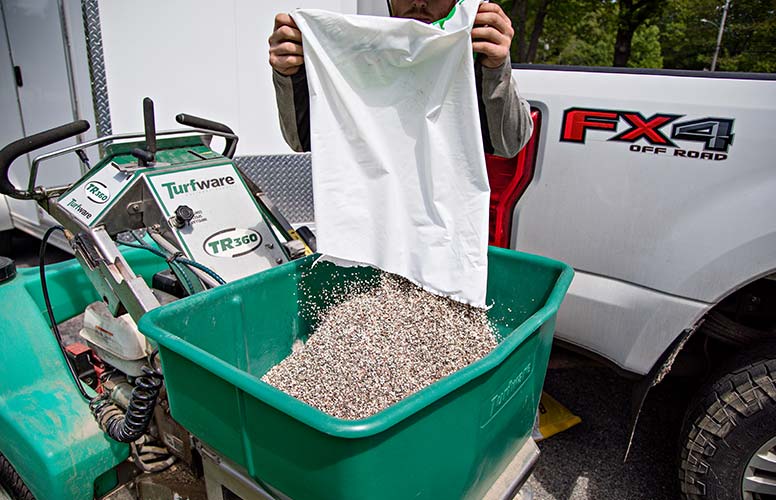Every Maine Homeowner’s Guide to Aeration & Overseeding
If you’re a Maine homeowner, you may have noticed patches in your lawn that need rejuvenation. You may be wondering about the best way to improve it...
The upkeep of your lawn is a task of the utmost importance as it not only enhances the aesthetic appeal of your property, but also contributes to a healthier environment. Fertilizers play a significant role in this maintenance, providing necessary nutrients that ensure the health and vitality of your lawn.
The benefits of using fertilizers are many — they foster rapid growth of grass, enhance its color, promote root development, and, overall, result in a lush and healthy lawn that’s a true pleasure to behold.
In this post, we’ll dive into the details of lawn maintenance, the usage and advantages of fertilizers, and their impact on your Maine lawn health. Read on for a comprehensive guide on achieving that lush green lawn you’ve always dreamt of!

Lawn fertilizer is a specially formulated mixture of nutrients designed to enrich your soil and promote the healthy growth of your grass. These nutrients fill the gaps in what your soil naturally provides, allowing your lawn to thrive even in less-than-ideal soil conditions.
Lawn fertilizer offers numerous benefits that enrich your lawn’s overall health:
Regularly applying the right kind of fertilizer can help maintain your lawn’s vitality over time, making it a worthwhile investment for any homeowner or business owner who wants to boost their property’s curb appeal.
There are typically two types of lawn fertilizers: organic and synthetic.
Organic fertilizers are derived from plant, animal, or mineral resources and are broken down by microbes in the soil to provide nutrients. In contrast, synthetic fertilizers are manufactured and have nutrients readily available to plants, but may not improve long-term soil health.
The N-P-K ratio relates to the three essential nutrients in fertilizers: Nitrogen (N), Phosphorus (P), and Potassium (K). These numbers represent the percentage of each nutrient in the fertilizer.
Nitrogen promotes leaf and stem growth, phosphorus enhances root development, and potassium improves overall plant health.
Aside from the major nutrients (N, P, and K), minor nutrients like calcium, magnesium, sulfur, and trace elements like iron and zinc can also be found in many lawn fertilizers.
These nutrients perform various functions to promote lawn health — from aiding in photosynthesis to improving grass’s disease resistance.
When selecting a fertilizer, multiple factors need to be considered:
Understanding fertilizer labels is essential in selecting the best product for your lawn. But now that you have the basics down from above, you’ll have a much better understanding!
The label will provide information about the N-P-K ratio, indicating the percentage of nitrogen, phosphorus, and potassium in the fertilizer. It may also list other nutrients included, such as calcium, magnesium, and iron. The label will also specify whether the fertilizer is organic or synthetic.
Organic fertilizers, while slower to release nutrients, improve the soil’s long-term health and fertility by fostering beneficial microbial activity. They’re also better for the environment. However, they’re typically more expensive than synthetic fertilizers.
Synthetic fertilizers provide nutrients more rapidly and can quickly green up a lawn and are usually more cost-effective. However, they may not enhance soil health over the long term and, if over-applied, can potentially harm the environment by leaching into waterways.
The timing of fertilization is influenced by the grass’s growth cycle. Cool-season grasses, for example, have two growth spurts — a moderate one in the spring and a significant one in the fall.
As a result, these types of grass should be fertilized in early spring and fall. Warm-season grasses, on the other hand, grow actively in the summer and should be fertilized in late spring or early summer.
For best results, it’s essential to apply fertilizer at the correct dosage, use the proper techniques, and implement safety measures:
Avoid the common mistake of over-fertilizing or under-fertilizing your lawn — both can lead to poor lawn health. Also, never fertilize before heavy rain, as the rain can wash away the applied fertilizer. Lastly, ensure the spreader is correctly calibrated to deliver the right amount of fertilizer.
A well-maintained lawn not only enhances the aesthetic appeal of your home or commercial property, but also provides a refreshing outdoor space for your family or customers. With proper fertilization techniques, you can ensure the vibrancy and health of your lawn throughout the changing seasons. Looking for help with fertilization for your Southern Maine home or business? Greencare can help. Contact us today for a free estimate.